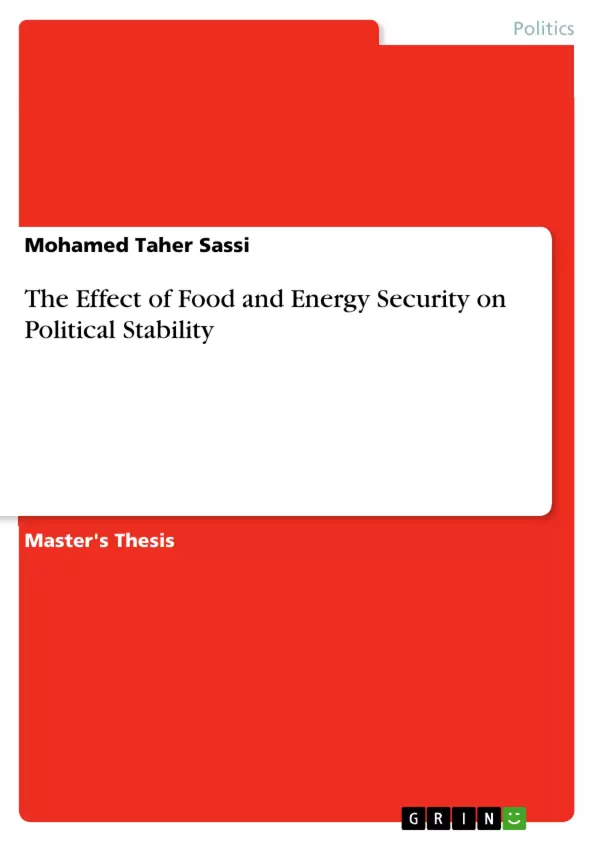Since both food security and energy security are countries’ strategic objective, this study typically advocates a deep understanding of the concept of political stability to incorporate food and energy security as a new pillar of conflict management based on an empirical understanding of the nexus and its effect. We used food deficit as proxy for food security and energy imports for energy security from the World Bank database.
Suffering, mutilation and death of human beings are the most obvious and important effects of all conflicts, as well as natural disasters. Yet, material losses are also important because they reduce the livelihood and recovery capacities of conflict survivors. Moreover, in many cases, the indirect effects of conflict cause more deaths than direct violence. It has been found that generally the indirect costs of war are greater than its direct costs and persist long after the end of the conflict. Instability and conflict affect many economic sectors such as reducing foreign exchange earnings, which can have serious consequences for development and food security. Indeed, global population growth combined with the effects of climate change on agriculture pose the risk of a Malthusian trap to humanity that can only be avoided by a more efficient and sustainable production system. Energy security policies and climate policies are often considered as two sides of the same coin, their objectives being at least complementary, if not identical.
Inhaltsverzeichnis (Table of Contents)
- 1-Introduction
- 2- Review of Literature
- 2.1. Review of theoretical literature
- 2.1.1 Energy Security
- 2.1.2 Food Security
- 2.1.3 Political Stability
- 2.2. Review of empirical literature
- 2.1. Review of theoretical literature
- 3- Research Design
- 3.1 Hypothesis
- 3.2 Panel methods
- 3.3 Methodology
- 3.4 Data
- 3.4.1 Independent variables
- 3.4.2 Dependent variable
- 3.5 Global Peace Index
- 4-Results and Discussion
Zielsetzung und Themenschwerpunkte (Objectives and Key Themes)
This study examines the relationship between food and energy security and political stability. It aims to understand the effects of these factors on conflict management and to provide empirical evidence for the nexus between them. The study utilizes panel data analysis to investigate the impact of food security, as proxied by food deficit, and energy security, as proxied by energy imports, on political stability. This research seeks to contribute to a deeper understanding of the complex interplay between these factors and their implications for global stability.
- The impact of food and energy security on political stability
- The role of economic growth, tourism, and institutional quality in promoting political stability
- The influence of destabilizing factors such as corruption and arable land scarcity
- The nexus between food security, energy security, and conflict management
- Policy recommendations for promoting food and energy security and fostering political stability
Zusammenfassung der Kapitel (Chapter Summaries)
The first chapter introduces the topic of food and energy security and their potential impact on political stability. The second chapter provides a comprehensive review of the existing literature on energy security, food security, and political stability, exploring both theoretical and empirical findings. This chapter lays the foundation for the research by highlighting key concepts and existing research gaps. The third chapter outlines the research design, including the hypothesis, methodology, data sources, and variables used in the study. This chapter delves into the specific analytical approach employed to investigate the relationships between the variables of interest.
Schlüsselwörter (Keywords)
The study focuses on the relationship between political stability, food security, and energy security. It employs panel data analysis to investigate the impact of food deficit and energy imports on political stability. The study also considers the role of economic growth, tourism, institutional quality, corruption, and arable land scarcity in influencing political stability. Key concepts include the nexus between food and energy security, conflict management, and the impact of these factors on global stability.
Frequently Asked Questions
How do food and energy security affect political stability?
Food deficits and high energy import dependence can lead to social unrest and economic vulnerability, which are significant drivers of political instability and conflict.
What is the "Malthusian trap" in the context of food security?
It refers to the risk that population growth outpaces agricultural production, potentially leading to famine and conflict if sustainable production systems are not implemented.
Why are energy security and climate policy often linked?
Both aim to reduce dependence on volatile fossil fuel markets and promote sustainable, local energy sources, thereby enhancing long-term national stability.
How does conflict affect a country's food security?
Conflict disrupts supply chains, destroys agricultural land, and reduces foreign exchange earnings, making it difficult for a nation to feed its population.
What role does institutional quality play in conflict management?
Strong institutions can mitigate the negative effects of resource scarcity by ensuring fair distribution and reducing corruption, which helps maintain political stability.
- Quote paper
- Mohamed Taher Sassi (Author), 2019, The Effect of Food and Energy Security on Political Stability, Munich, GRIN Verlag, https://www.grin.com/document/882480



